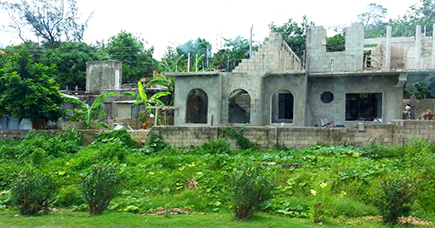 Imagine staring down the road, seeing dozens of half-built houses.
Imagine staring down the road, seeing dozens of half-built houses.
I’m not talking about houses that are actively under construction. And I’m not talking about decrepit old houses that need to be torn down.
I’m talking about houses that were partially built … and then nothing. No active construction. No wheelbarrows or cement mixers or sweaty workers taking cigarette breaks. Just half-built house after half-built house.
That’s what I saw during my trip to Jamaica last week. Don’t get me wrong; I spotted plenty of complete houses, too, but partially-constructed homes were far from rare.
“What’s the story here?” I asked my taxi driver. He smiled.
“People don’t have money to build a whole house all at once,” he said. “So they build one room at a time. It might take five, ten, fifteen years for the house to be complete.”
Welcome to a world that’s not fueled by credit.
Now, before I proceed with the rest of the story, let me make a disclaimer here and say that I’m certainly not an expert on Jamaican culture. I’m quoting a random cab driver. Take his words with a grain of salt.
That said, I’ve traveled to many countries – and was born in a country – in which credit is much, much tougher to obtain than it is in the U.S. In those places, many 25-to-35-year-olds don’t have the privilege of being able to get a mortgage as soon as they can prove two years of work history, a decent credit score, and a low debt-to-income ratio. Life is much easier here in the U.S.
Of course, life in the U.S. is also fueled by debt.
“People in America don’t have the money to build a whole house, either,” I told the cab driver. “They only own a small fraction of that house, maybe one-tenth or one-fifth of it. The bank owns the rest.”
Here’s the interesting juxtaposition between the two circumstances: In both situations, people will still spend 10 or 15 years (or 30 years) paying for a house. But in one scenario, that payment gets made in advance. In another scenario, the payment is retroactive.
America is one of the rare countries in which people as young as 25 or 30 can buy their own home, thanks in large part to cheap debt flowing from banks. And when youngsters are buying houses, they’re also buying furniture, rugs, TVs, dishwashers. When credit flows freely, consumption doesn’t end.
That’s bad when you’re keeping up with the Joneses. But let’s not be pessimistic. It also has a bright side.
Thanks to this situation – because we can buy now, pay later — we have mobility, which is awesome. We’re not stuck in our hometown. We can chase education and career opportunities in different cities and states.
When we move to a new city, where we don’t know a soul (and can’t live with family), we can borrow money to buy a house, or we can rent a house from a landlord who almost certainly borrowed money in order to provide us with that rental.
Ah, economic mobility. #FueledByDebt
Unfortunately, some people get stuck in cubicles paying down that debt. And their stress levels might shoot – um – through the roof. (No pun intended).
In countries where ordinary people have limited access to credit, houses are much harder to acquire. And (speaking of mobility) so are cars. It’s tougher to buy a set of wheels when you can’t roll out of bed, cruise to the dealership, and sign-on-the-dotted-line for “no money down” and “low monthly payments.”
When the average consumer can’t swipe an AmEx, the scene changes – both for better and worse. People aren’t stressed about their MasterCard balance, but they also deal with inconveniences that Americans can’t imagine – like living with their parents until they’re 40 or enduring tropical heat without an air conditioner.
Resisting the Mentality
So is a less-credit-fueled society good or bad?
It’s a mixed blessing. On one hand, our debt-fueled spending creates jobs. After all, someone has to wear a tie and work at a car dealership. Someone needs to underwrite mortgages and pre-approve your next Visa offer and sell you a mattress with a payment plan.
Then again, many things create jobs. Like the Internet. And your own imagination.
Speaking of which, business loans – which are a completely different animal than consumer loans – can elevate people to a new level in life. You snag a lucrative contract, but the client will pay upon completion, so you need to borrow money to buy a forklift for the job. Or you find a rental property that features 18 percent returns. Or you’re an optometrist who wants to borrow money to buy a LASIK machine so you can open your own clinic.
Opportunities come alive when people can leverage their businesses in wise, judicious ways. (That’s why I said that if I had a million dollars, I’d go into debt.)
On a broad scale, debt can serve a fantastic social good.
But here’s the rub: it’s easy to fall into a mentality of “buy now, pay later.” That type of thinking can be corrosive to your net worth if you spend that money on the wrong things.
Which is why I appreciate visiting societies in which loans aren’t the default method of payment, places where no one assumes that you’ll borrow the cash to buy your next car or house. It reminds me that borrowing money should be the rare exception, not the norm.
And it reminds me to be grateful for those rare instances in which I’m able to use leverage to elevate my status in life – rather than dig myself into a hole.
